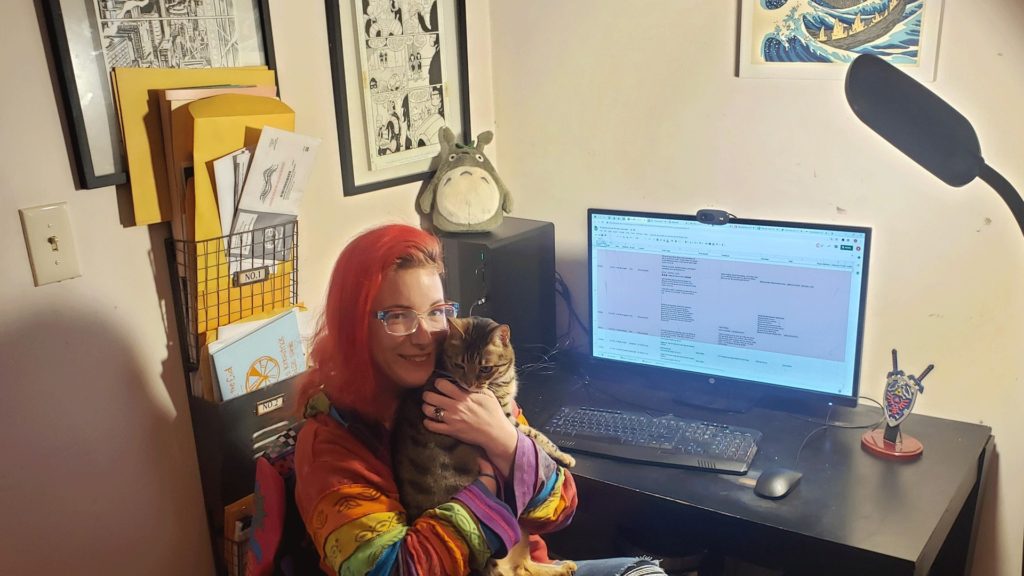Akupara Games is a fully remote video game developer and publisher operating mainly out of Los Angeles, California. My name is Alyssa Kollgaard and I am Akupara’s main producer across all of our development, marketing and publishing efforts. We have been successfully shipping products for over three years across a multitude of genres, engines (Unity, Unreal 4 and GameMaker), team sizes and make-ups (development, co-development, work for hire, marketing and publishing) - all while working exclusively from home.
As companies seek to practice social distancing and establish work from home routines in the wake of COVID-19 shut downs, we wanted to share some of the best practices that have allowed us to be successful while working remotely.
Tips for Employees
Working remotely isn’t just new for many companies but for many employees as well. Honestly, not everyone is suited to this type of arrangement; some of us function much more efficiently in the physical presence of our peers. We thrive on the collaboration, the friendship, the routine, the structure, the accountability, and the communication that being in a shared space naturally encourages. For many people, the loss of proximity creates an entirely new challenge to overcome - on top of having to deal with navigating the anxiety of an international crisis.
Being successful while working remotely doesn’t just fall upon the shoulders of management, however. It requires buy-in from everyone involved in order to function with efficacy. If this will be your first time working from home, here are some best practices to get you started.
That being said, some of us find working remotely to be even more effective - and you may be surprised how much more you get done if you stick to these guidelines.
 Alyssa Kollgaard and her favorite coworker[/caption]
Alyssa Kollgaard and her favorite coworker[/caption]
Establish and maintain routine
It is really easy to fall into the trap of thinking of this as a staycation of sorts. It is important, however, to resist the urge to roll out of bed and do your job in your pajamas, or with no pants on, or unshowered, or any number of other things you would never do in an office environment. On the surface it seems like this may be a benefit to working from home - but this can quickly snowball into other aspects of your job or your life.
Set expectations upon yourself and stick to them the same way you would normally. If your morning starts by stretching, drinking a cup of coffee, going for a run, listening to music, eating breakfast - great! Continue to do all of that. If you normally stop by Starbucks and want to avoid public places, try to find substitutions for the experience that can be done at home (pick up a bag of Starbucks coffee and prepare it for yourself each morning). A lot of things are going to be very different now that you are working from home, and it’s important that you maintain the aspects of your original routine that are within your control. Psychologically, this will get you in the mindspace to do a job, even if your working environment is now your home. Do your best to avoid triggers that lead to depression.
Your home is where your leisure time is spent - your pets and hobbies are here, you have your own list of things to do around the house. There are a lot of distractions that don’t exist at an office, and you are incumbent upon yourself to stay on target. You don’t have anyone watching over your shoulder to make sure you are staying on track, so this is now entirely your responsibility.
Try to keep the same timing you would at work - your start time, your breaks, your lunch, and your endtime - so that this becomes second nature to you, and your coworkers can reliably work around your availability.
Set boundaries and expectations
The other half of routine is boundaries. These are important in many different contexts. If you know you are prone to mindlessly scrolling social media, there are several apps that can help you monitor yourself or limit usage. Limit outside distractions as much as possible.
If you live with other people, make sure that they respect that this is now your office. Ask them not to bother you during established work hours. Lock your doors and put on headphones if you have to.
If you are a parent impacted by school closures, this becomes more challenging - work with your partner or fellow caretakers to set expectations and allow for uninterrupted working hours. Make sure your employer has visibility into your situation so that they can work with you to be effective. This may mean splitting your work days, or working on weekends when you have someone else available to wrangle children, or establishing a nanny-share situation, or any number of other things that are unique to your specific situation. Open communication is important so that we can try to accommodate families during uncertain times.
Likewise, it’s important to be honest about when you think you won’t be able to hit deadlines you have committed to. We’re all figuring this out together, but it’s harder to make it work if we don’t have all the information to make an informed plan. This is impacting companies globally right now, and lots of balls are going to be dropped - just be sure you communicate when this is going to happen early and often, so that people who are relying on you can adjust accordingly.
It’s equally important to set boundaries with your employer. Let them know what hours you are available for work, and turn off notifications during the hours you have set as being unavailable. Keep in mind that work will oftentimes happen asynchronously, as other people in your organization need to account for this new routine as well. Emails and messages will likely come to you at all hours of the day, so be sure you have clearly defined “on” and “off” hours. It’s very easy for work life to bleed into home life otherwise.
“I think one of the things people who start working from home can sometimes face is a sense of guilt when they're not working. Without any kind of hard barrier between ‘being at work,’ and being at home, the line can get fuzzy and it's easy to fall into the trap of thinking that because there's still work that needs to be done, you're doing something wrong by taking time for yourself. This is why routines and boundaries are so important.
For many people, this can mean letting the clock be the boss - have a clear starting time and a clear ending time, just as you would if you were in a physical office, and use that time.
I've found that people work from home most effectively when there are concrete deliverables and deadlines. It feels good to keep a promise and deliver something you're proud of when you said you'd have it done. When people drift, I find it's most often because they're not really quite certain of what they're doing, or the task they're working on is so vague or unattainable that it never really feels like progress is being made. It's valuable to break big jobs into smaller tasks - not just to make organization and tracking easier, but also because completing each of those small concrete tasks is a tangible thing that makes progress feel real.” - Kevin Mack, COO remote VR company Manic Machine Games
 Ludicrous Speed by Manic Machine Games[/caption]
Ludicrous Speed by Manic Machine Games[/caption]
Along those lines...
Honor your work space and your living space
This one is one of the most important tips, while also being one of the most challenging depending on the kind of space you inhabit. Having distinct areas for “work” and for “home” is an important tool for compartmentalizing. Try to establish a single area as your “office” - whether it be your desk, or your laptop in a specific part of your house, or a room (if you’re lucky). Don’t make your workspace somewhere that is essential to your relaxation routine, your sleep or your health - don’t work on your laptop from your bed, for example. This needs to remain a place of sanctity.
Even if your space is limited to a bedroom, do what you can to dedicate an area of the room as “work”, and the rest as “home”. It becomes very difficult to turn off work mode and maintain normalcy if there are not distinct physical boundaries between them. Make sure that anyone you live with also respects this area as your work space.
Tips for Companies
A lot of my recommendations here are through the lens of a producer with an Agile/Scrum approach. Many of the practices in this project management style work just as well remotely as they do in person; it’s just a matter of adjusting them slightly for the new circumstances. Take these as generalized best practices and adjust according to your needs. Also, keep in mind that it’s likely you aren’t going to nail it the first time - give it a week or two and if you are finding something ineffective, feel free to adjust (that’s the beauty of the Agile/Scrum methodology).
It is important for you to establish expectations and guidelines while still being flexible enough to accommodate your employees individual needs. Communication is more important now than ever before. Provide a foundation that allows for your employees to be effective in their roles, but be sure that you are likewise being empathetic and understanding during this transition and the uncertainty it brings.
Standups and Meetings
Standups are absolutely essential to success! Be sure that you are checking in with everyone early in the day. Standups should happen at the same time every day and all team members with adjacent tasks should be expected to participate. Standups can happen on a video call or a chat program of your choice (but should happen in real time as much as possible, not asynchronously, so that priorities can adjust if needed). These can be company wide, project wide, or discipline specific - up to you how you arrange them. Just be sure that any information that comes out of these standups is relayed to the people who need it.
Generally, standups should follow this format:
What I have done since last time
What I am working on today
Where I expect to be by EOD
Any blockers
The purpose of this practice is to set priorities and expectations, maintain visibility and keep communication open, establish routine, work toward common goals, and course correct early on. If someone is working on the wrong thing, you’ll know before they go too far down the wrong path. If someone is blocked, you can begin to address it. If someone is working from incorrect information, or needs help prioritizing their tasks, this is the time to do it as well.
Regardless of team size, I recommend doing this daily - it helps maintain contact between coworkers, with accountability, and it answers questions that would naturally come up over the course of a physical workday. We do our standups on Slack in a specific standup channel to keep it visible and clean, but they can happen on Discord, GoogleMeet or Skype as well.



































